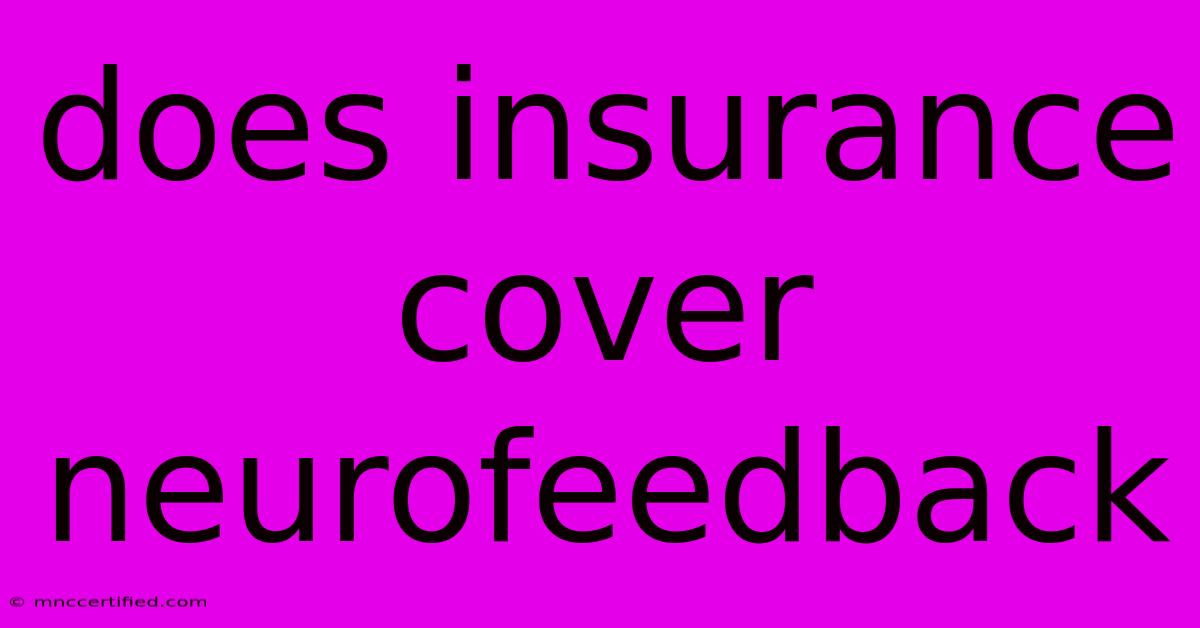Does Insurance Cover Neurofeedback

Table of Contents
Does Insurance Cover Neurofeedback? A Comprehensive Guide
Neurofeedback, a type of biofeedback, is gaining popularity as a potential treatment for various neurological and psychological conditions. However, a common question arises: Does insurance cover neurofeedback? The answer, unfortunately, isn't a simple yes or no. Coverage varies significantly depending on several factors. This comprehensive guide will delve into the complexities of insurance coverage for neurofeedback, helping you navigate the process and understand what to expect.
Understanding the Variables Affecting Insurance Coverage
Several factors influence whether your insurance company will cover neurofeedback therapy:
1. Your Insurance Provider:
This is the most significant factor. Different insurance companies have different policies. Some may cover neurofeedback if it's deemed medically necessary and prescribed by a licensed professional. Others may explicitly exclude it from their coverage. Even within the same company, coverage can vary based on your specific plan.
Check your policy documents carefully. Look for specific mentions of neurofeedback, biofeedback, or similar therapies. Contact your insurance provider directly to inquire about their coverage for neurofeedback under your specific plan. Don't hesitate to ask for clarification on any ambiguities.
2. Your Diagnosis:
The specific condition you're seeking treatment for plays a crucial role. Insurance companies are more likely to cover neurofeedback if it's used to treat a diagnosable condition recognized by the medical community, such as:
- ADHD (Attention-Deficit/Hyperactivity Disorder): Neurofeedback is sometimes used as an adjunctive therapy for ADHD.
- Anxiety disorders: It may be covered if part of a comprehensive treatment plan for anxiety.
- Depression: Similar to anxiety, coverage depends on the specifics of the treatment plan and the severity of the depression.
- Traumatic Brain Injury (TBI): Neurofeedback is sometimes used in rehabilitation after TBI.
- Epilepsy: In some cases, neurofeedback may be considered for seizure management.
Important Note: Even with a recognized diagnosis, coverage is not guaranteed. Your doctor must clearly document the medical necessity of neurofeedback as part of your treatment plan.
3. Your Doctor's Role:
Your doctor's involvement is crucial. The neurofeedback provider should be a licensed professional, and the treatment should be prescribed as part of a comprehensive treatment plan by your primary care physician or a specialist. This strengthens the argument for medical necessity when submitting claims. Ensure your doctor is familiar with your insurance policy and willing to support your claim.
4. The Type of Neurofeedback Provided:
The specific type of neurofeedback used may also affect coverage. Different techniques exist, and insurance companies might be more inclined to cover those with established research and evidence of effectiveness.
5. Documentation and Pre-Authorization:
Thorough documentation is vital. Before starting neurofeedback, contact your insurance company to determine if pre-authorization is required. Keep detailed records of your sessions, diagnoses, and the provider's qualifications. This comprehensive documentation strengthens your claim for reimbursement.
Strategies to Maximize Your Chances of Coverage
- Check your Explanation of Benefits (EOB): Carefully review your EOB after each session to understand what was covered and what was denied.
- Appeal denied claims: If your claim is denied, understand the reasons for denial and consider appealing the decision. Provide additional documentation to support your case.
- Explore alternative payment options: If insurance doesn't cover neurofeedback, consider options like payment plans with the provider or exploring alternative therapies.
- Seek a provider experienced with insurance billing: Some neurofeedback providers have more experience navigating insurance claims, making the process smoother.
Conclusion: Navigating the Insurance Maze
While insurance coverage for neurofeedback is not guaranteed, understanding the variables and taking proactive steps can significantly improve your chances of reimbursement. By thoroughly researching your insurance policy, maintaining clear communication with your doctor and the neurofeedback provider, and meticulously documenting your treatment, you can increase your likelihood of successful insurance coverage for this potentially beneficial therapy. Remember, persistence and proactive communication are key to navigating this complex process.

Thank you for visiting our website wich cover about Does Insurance Cover Neurofeedback. We hope the information provided has been useful to you. Feel free to contact us if you have any questions or need further assistance. See you next time and dont miss to bookmark.
Featured Posts
-
Cost Of Crna Malpractice Insurance
Nov 16, 2024
-
Cynthia Erivo Vocal Activism
Nov 16, 2024
-
Does Smile Direct Accept Insurance
Nov 16, 2024
-
Portugal Vs Poland Uefa Nations League Match Time
Nov 16, 2024
-
Portugals Foreign Bribery Problem Act Now
Nov 16, 2024